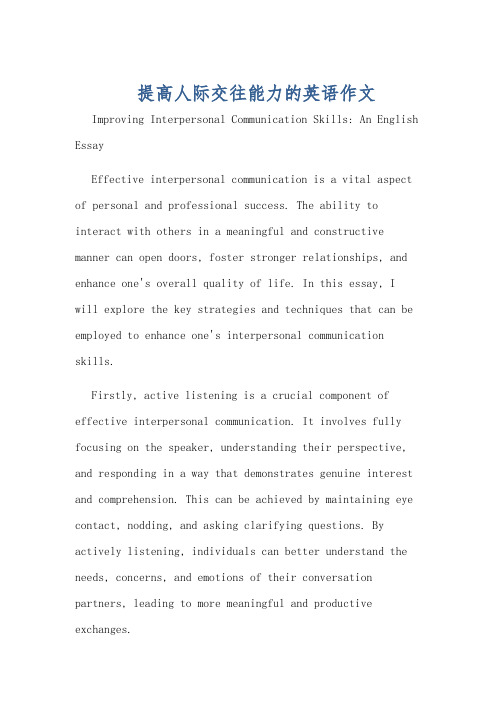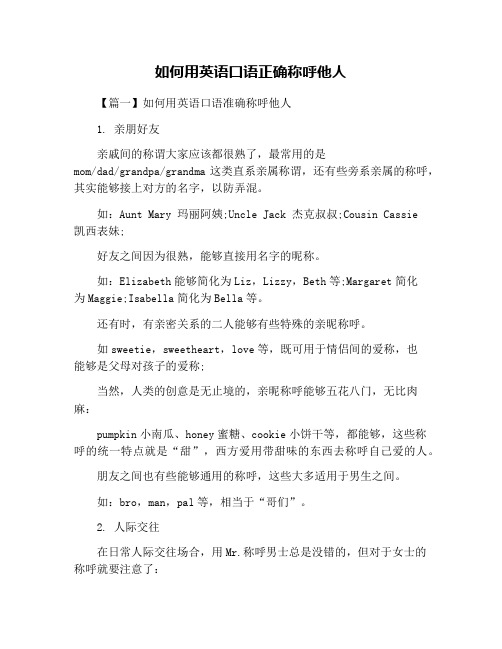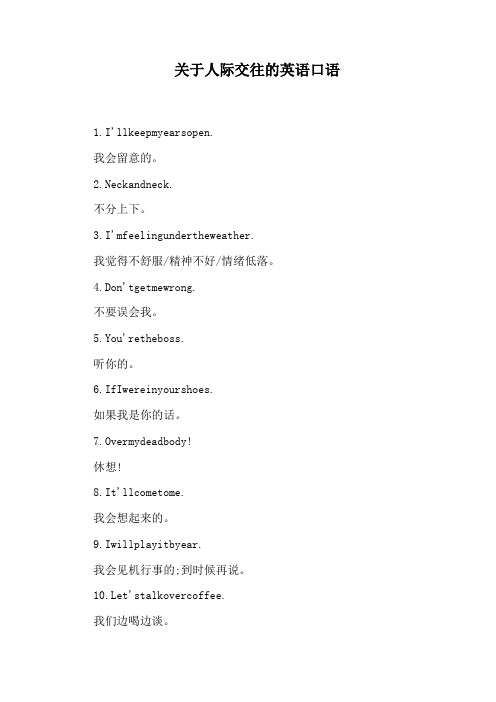英语口语之人际交往篇
英语口语-五大秘籍练就地道英语口语

美联英语提供:五大秘籍练就地道口语秘籍一、风险转移法记得有一年的口语第一部分考到“鸟”为题目,考官问:“What are the most popular birds in China and what meanings do the y have?”面对这个问题,多数烤鸭是否知道在中国流行的鸟究竟有哪些,事实上应该连鸟的英文名字都叫不上来吧。
我给大家的建议:遇到自己没有准备过并且不熟悉的题目,烤鸭可以坦然地告诉考官:“I don’t really know much about birds.”或者干脆说:“I don’t know.”态度一定要坦然,目光一定要坚定。
但是记住,这永远不是问题回答的结束。
接下来一定要说“but”。
可是but之后又该说什么呢?胡侃瞎侃可以吗?完全可以!最终的目的是把风险要转嫁出去。
“but one of my friends is crazy about birds, and he used to tell me...”相信比你自己迟迟不给考官答案好得多得多,切忌不懂装懂!秘籍二、昵称效应给大家先举一个我曾经教过的小烤鸭的例子,他遇到物品的考题,要谈一样有用的设备,他略想一下说“well,I am going to talk about my little girlfriend then…”考官听到这里刚要纳闷怀疑该烤鸭是不是没读懂题目,然后听到“…my iPad2, a very trendy stuff and also a very useful electro nic device, which I would always take along with me wherever I go.”这个时候,考官就会恍然大悟。
“哦,原来这该生在运用修辞,在玩幽默,还把自己的iPad当成了女朋友。
呵呵,真是有心了。
”烤鸭可以发挥自己的想象力,把回答问题当做与朋友分享的趣事,这样更能打动考官的心扉。
初中英语读写课“Tips for Good Communication”课例

ZHONGXIAOXUE KETANG JIAOXUE YANJIU一、教学分析1.教学内容分析教学内容是连接教师的教和学生的学的桥梁和纽带,是教学目标的具体表现形式[1]。
本课教学内容选自冀教版教材《Learning English》九年级上册“Unit9 Communication”中的“Lesson 50 Tips for Good Communication”。
文本话题是社会交往,话题的核心词汇包括communication,get along well with,keep promises,cancel等。
本单元各课以话题为中心,选取的阅读文章从学生生活实际出发,解决学生交往困惑,对其确立积极人生态度和交友原则有良好的指导作用。
本课主题“Tips for Good Communication”与本单元主题“Communication”紧密联系,但是本节课的交往建议阅读内容与学生学习主目标(为校报“与人沟通技巧”专栏投稿)之间,缺少适当的“支架”,对于大部分学生来说难度较高。
因此,需要教师设置写作指导环节,为学生独立写作搭好台阶。
2.学生分析本课授课对象为保定市某中学九年级某班学生,共30人。
大部分学生能够适应全英语授课,能很好理解文本内容,并能积极主动参与课堂活动。
学生已具备基本的写作能力,但写作句式单一,段落划分不清晰,写前构思与谋篇布局的习惯欠缺。
因此,教师要做好读后总结归纳和写前指导工作,搭建“支架”,帮助学生顺利达成本课学习目标。
3.教学目标本节课的课型是读写课,阅读材料是语言输入的关键。
本节课学生学习主目标是完成一篇交往建议文章的写作,以此来给同龄人的交往困惑出谋划策,课堂一切活动均服务于主目标。
基于对阅读材料和学生情况的分析,本课设定了以下教学目标:(1)理解以下词汇:interpersonal, eye contact,passport, proper;能在语境中运用以下词汇:cancel, keep promises, waste time doing,ahead of time。
提高人际交往能力的英语作文

提高人际交往能力的英语作文Improving Interpersonal Communication Skills: An English EssayEffective interpersonal communication is a vital aspect of personal and professional success. The ability to interact with others in a meaningful and constructive manner can open doors, foster stronger relationships, and enhance one's overall quality of life. In this essay, Iwill explore the key strategies and techniques that can be employed to enhance one's interpersonal communication skills.Firstly, active listening is a crucial component of effective interpersonal communication. It involves fully focusing on the speaker, understanding their perspective, and responding in a way that demonstrates genuine interest and comprehension. This can be achieved by maintaining eye contact, nodding, and asking clarifying questions. By actively listening, individuals can better understand the needs, concerns, and emotions of their conversation partners, leading to more meaningful and productive exchanges.Secondly, the importance of non-verbal communication cannot be overstated. Body language, tone of voice, and facial expressions can convey a wealth of information that goes beyond the spoken word. Individuals should be mindful of their own non-verbal cues and strive to align them with the message they wish to convey. For instance, maintaining an open and approachable posture, using a warm and engaged tone, and making eye contact can help to establish a positive and trustworthy rapport with others.Thirdly, effective communication requires the ability to adapt one's style and approach to different situations and individuals. This involves developing a keen sense of emotional intelligence, or the capacity to recognize and manage one's own emotions, as well as those of others. By being attuned to the needs and preferences of their conversation partners, individuals can tailor their communication style to better resonate with their audience and foster more productive and meaningful interactions.Fourthly, the art of constructive feedback is a crucial skill in interpersonal communication. Providing honest and thoughtful feedback, whether positive or negative, can helpindividuals to grow, learn, and improve their performance. However, it is essential to do so in a manner that is respectful, sensitive, and focused on the specific behavior or outcome, rather than on the person themselves. This approach can help to build trust, strengthen relationships, and promote a culture of continuous learning and improvement.Finally, the ability to manage conflict effectively is a hallmark of strong interpersonal communication skills. Conflict is a natural part of human interaction, and the way it is handled can either strengthen or weaken relationships. Individuals should strive to approach conflict with an open mind, a willingness to listen and understand the other person's perspective, and a focus on finding mutually beneficial solutions. By adopting a collaborative and problem-solving mindset, individuals can navigate even the most challenging interpersonal situations with grace and effectiveness.In conclusion, the development of strong interpersonal communication skills is a critical aspect of personal and professional success. By mastering the art of activelistening, non-verbal communication, emotional intelligence, constructive feedback, and conflict resolution, individuals can build more meaningful and productive relationships, navigate complex social and professional situations with ease, and ultimately achieve greater fulfillment andsuccess in all areas of their lives.提高人际交往能力的英语作文有效的人际交流是个人和职业成功的重要方面。
英语职场面试口语对话

英语职场面试口语对话(总5页)--本页仅作为文档封面,使用时请直接删除即可----内页可以根据需求调整合适字体及大小--英语职场面试口语对话这是一篇由网络搜集整理的关于英语职场面试口语对话的文档,希望对你能有帮助。
英语职场面试口语对话1问:为什么你认为你能胜任我们公司这个职位呢?Why do you think you are qualified for this position?答:我的人际交往能力很强。
我在上个公司就职时,熟练掌握了工作流程,而且我具有团队精神和出色的人际关系技能。
I have excellent communication skills . I am familiar with the procedures of the last company I worked for. Besides, I am a team player and have great interpersonal skills.问:你为什么辞去上份工作呢?Why did you leave your last job?答:我喜欢我上一份工作,而且它和我在贵公司应聘的这个职位很相似,但我上一份工作的薪水太低,所以我想离开。
I like my last job and it is similar to the position I am applying for in your company, but the salary of my last job was too low so I decided to leave.问:你希望的薪金是多少呢?What salary are you expecting?What kind of salary are you seeking?What range of pay scale are you interested in?答:我希望起薪5000元。
My desired starting salary is 5,000 yuan.英语职场面试口语对话2A: Tell me about yourself and your past experience.A:说说你自己和你过去的经历好吧。
如何用英语口语正确称呼他人

如何用英语口语正确称呼他人【篇一】如何用英语口语准确称呼他人1. 亲朋好友亲戚间的称谓大家应该都很熟了,最常用的是mom/dad/grandpa/grandma这类直系亲属称谓,还有些旁系亲属的称呼,其实能够接上对方的名字,以防弄混。
如:Aunt Mary 玛丽阿姨;Uncle Jack 杰克叔叔;Cousin Cassie凯西表妹;好友之间因为很熟,能够直接用名字的昵称。
如:Elizabeth能够简化为Liz,Lizzy,Beth等;Margaret简化为Maggie;Isabella简化为Bella等。
还有时,有亲密关系的二人能够有些特殊的亲昵称呼。
如sweetie,sweetheart,love等,既可用于情侣间的爱称,也能够是父母对孩子的爱称;当然,人类的创意是无止境的,亲昵称呼能够五花八门,无比肉麻:pumpkin小南瓜、honey蜜糖、cookie小饼干等,都能够,这些称呼的统一特点就是“甜”,西方爱用带甜味的东西去称呼自己爱的人。
朋友之间也有些能够通用的称呼,这些大多适用于男生之间。
如:bro,man,pal等,相当于“哥们”。
2. 人际交往在日常人际交往场合,用Mr.称呼男士总是没错的,但对于女士的称呼就要注意了:Mrs. 用于已婚女士,相当于太太、夫人Miss 用于未婚女士Ms. 可通用,相当于“女士”Mme (Madam)和Ma’am 多用于已婚女士有一些职业,可在后面直接加上姓,会更有礼貌,显得你尊重对方。
如:Dr. Lee (读为Doctor Lee), 李医生Prof. Geller (读为Professor Geller), 盖勒教授Captain Smith,史密斯船长/舰长/上尉Colonel Longfellow, 朗费罗少校General Grant, 格兰特将军President Obama, 奥巴马总统Headmaster Bass,拜斯校长Father Crawley,克劳利神父Sister Mary, 玛丽修女3. 贵族称呼虽然大家遇到贵族的机会微乎其微……但是了解一下总没坏处的。
关于人际交往的英语口语

关于人际交往的英语口语1.I'llkeepmyearsopen.我会留意的。
2.Neckandneck.不分上下。
3.I'mfeelingundertheweather.我觉得不舒服/精神不好/情绪低落。
4.Don'tgetmewrong.不要误会我。
5.You'retheboss.听你的。
6.IfIwereinyourshoes.如果我是你的话。
7.Overmydeadbody!休想!8.It'llcometome.我会想起来的。
9.Iwillplayitbyear.我会见机行事的;到时候再说。
10.Let'stalkovercoffee.我们边喝边谈。
11.Takeiteasy.轻松一点;别紧张;放松放松。
12.Let'sgivehimabighand.让我们热烈鼓掌。
13.AsfarasI'mconcerned.就我而言。
14.I'muptomyearsinwork.我忙死了。
15.Youcan'tdothistome.你不能这么对我。
16.Justtobeonthesafeside.为了安全起见。
17.It'sbeenalongtime.好久不见了。
18.It'sabouttime.时间差不多了。
19.Ican'timaginewhy.我想不通为什么。
20.That'sreallysomething.真了不起。
21.Excusemeforamoment.失陪一会儿。
22.I'mdyingtoseeyou.我真想见你。
23.I'mflattered.过奖了。
24.Youcannevertell.不知道/谁也没把握。
25.Iwon'tbuyyourstory.我不信你那一套。
英语口语交际常用语及其翻译

英语口语交际常用语及其翻译在日常生活中,英语口语是我们与外国人沟通交流的重要工具。
掌握一些常用的口语表达,不仅能帮助我们更流利地与他人交流,也能增加自信心。
下面列举了一些英语口语交际常用语及其翻译,希望对大家的英语口语能力提升有所帮助。
打招呼与问候•Hello. 你好。
•Hi! 嗨!•How are you? 你好吗?•I’m fine, thank you. 我很好,谢谢。
•Nice to meet you. 很高兴见到你。
•Good morning! 早上好!•Good afternoon! 下午好!•Good evening! 晚上好!•How have you been? 最近怎么样?介绍自己与他人•My name is [name]. 我叫[name]。
•What’s your name? 你叫什么名字?•This is my friend, [name]. 这是我的朋友,[name]。
•Nice to meet you, [name]. 很高兴见到你,[name]。
•Where are you from? 你来自哪里?•I’m from [country/city]. 我来自[国家/城市]。
•What do you do for a living? 你做什么工作?•I’m a [occupation]. 我是一名[职业]。
礼貌用语•Please. 请。
•Thank you. 谢谢。
•You’re welcome. 不客气。
•Excuse me. 对不起/请问。
•I’m sorry. 我很抱歉。
•May I ask a question? 我可以问个问题吗?•Sure! 当然可以!日常交流•How can I help you? 我可以帮你什么忙?•Can you speak more slowly? 你能说慢一点吗?•I don’t understand. 我不明白。
•Could you repeat that, please? 你能再重复一遍吗?•What do you mean? 你是什么意思?•That’s a good idea. 那是个好主意。
非语言沟通案例2篇

非语言沟通案例2篇Nonverbal communication cases演讲人:JinTai College非语言沟通案例2篇前言:演讲是指在公众场合,以有声语言为主要手段,以体态语言为辅助手段,针对某个具体问题,鲜明、完整地发表自己的见解和主张,阐明事理或抒发情感,进行宣传鼓动的一种语言交际活动。
本文档根据题材主题演讲内容要求展开说明,具有实践指导意义,便于学习和使用,本文档下载后内容可按需编辑修改及打印。
本文简要目录如下:【下载该文档后使用Word打开,按住键盘Ctrl键且鼠标单击目录内容即可跳转到对应篇章】1、篇章1:非语言沟通(规范版)2、篇章2:非语言沟通基础版篇章1:非语言沟通(规范版)小王问小杨:“人家都说沉默是金,你说,沉默真的是金吗?” 小杨说:“不一定。
那次我和小白一起带团在西安,我们向客人推荐‘贵妃宴’。
介绍完了,问客人吃不吃的时候,二十多位客人都一声不吭——沉默!我一看苗头不对就溜了。
小白看在地陪的面子上,又去问客人吃不吃。
结果呀,被客人骂了一顿。
客人说:‘让我们掏钱的事,你们怎么这么积极!’你看,沉默是什么?”小王说:“照这么说,沉默有时不是金,而是暴风雨来临前的宁静啊!可是,如果客人把话说出来你就一定能明白他的意思吗?”小杨说:“那要看客人怎么说。
比如,他对你说‘你真好’,你知道这是什么意思吗”?“如果他把重音放在‘你’字上,我想他是真的说我好。
如果他把重音放在‘好’字上,那就不好说了,可真可假。
如果他把重音放在‘真’字上,而且把声音拖长,说成‘你真——好’,那就基本上可以肯定他是在讽刺我。
”小王说:“我也注意到了,客人要强调什么的时候,是会用重音来强调的。
比如,你问他要不要增加某一个景点,他如果明确表态,就会在说‘我们不去’的时候,把‘不’字说得重一点,或者干脆一字一顿的回答:‘我—们—不—去’!” 小杨说:“是啊,恐怕有时候客人哼一声、出口长气,你都要想想那是什么意思!” 小王问道:“这哼哼声到底是什么意思呢?” 小杨说:“那就要看具体情况了。
- 1、下载文档前请自行甄别文档内容的完整性,平台不提供额外的编辑、内容补充、找答案等附加服务。
- 2、"仅部分预览"的文档,不可在线预览部分如存在完整性等问题,可反馈申请退款(可完整预览的文档不适用该条件!)。
- 3、如文档侵犯您的权益,请联系客服反馈,我们会尽快为您处理(人工客服工作时间:9:00-18:30)。
英语口语之人际交往篇
▼提出邀请
我们几个朋友准备在我家聚一聚。
We're going to have a few friends over at my house. A: We're going to have a few friends over at my house. Would you like to come? 我们几个朋友准备在我家聚一聚,你能来吗?
B: Absolutely yes. 当然要去。
我们晚上有个派对,你来吗? We have a party tonight. Would you like to come?
A: We have a party tonight. Would you like to come?
我们晚上有个派对,你来吗?
B: I'd love to. 我很愿意来。
我想请你喝杯酒。
I want to buy you a drink.
A: I want to buy you a drink. 我想请你喝杯酒。
B: That's great. 那太好了。
到我家来一起喝几杯怎么样? Could you come to my house for beer?
A: Could you come to my house for beer?
到我家来一起喝几杯怎么样?
B: I'd love to very much. 很高兴有这么一个机会。
我想约你今晚和我跳舞去。
I'd like to have you dance with me tonight. A: I'd like to have you dance with me tonight. Are you free?
我想约你今晚和我跳舞去,你有时间吗?
B: Yes. 有时间。
这个周末你打算干什么? What are you doing over the weekend?
A: What are you doing over the weekend?
这个周末你打算干什么?
B: I'm thinking about it. 我正在考虑呢。
你下个星期天有什么打算吗? Do you have anything to do next Sunday? A: Do you have anything to do next Sunday?
你下个星期天有什么打算吗?
B: Up till now, I have no plan. 到面前为止我还没想好。
我会等到你有空的时候。
I can wait at your leisure.
A: I'm very busy. Don't call me any more today.
我很忙。
今天别再给我打电话了。
B: I can wait at your leisure. 我会等到你有空的时候。
等你有时间我再打电话给你。
I'll call you when you have time.
A: Now I have something urgent to deal with.
我现在有急事需要处理。
B: Then I'll call you when you have time.
那等你有时间我再打电话给你。
你星期二晚上准备做什么? What're you going to do on Tuesday night? A: What're you going to do on Tuesday night?
你星期二晚上准备做什么?
B: What for? 有什么事情吗?
这个星期天你有时间吗? Are you free this Sunday?
A: Are you free this Sunday? I want to invite you to a fashion show. 这个星期天你有时间吗?我想邀请你去看时装表演。
B: That's great. 太好了。
12号你忙吗? Are you busy on the twelfth?
A: Are you busy on the twelfth? 12号你忙吗?
B: I will have a conference on that day. 那天我要开会。
你什么时间能来参加我们的野餐呀? When can we expect you for a picnic? A: When can we expect you for a picnic?
你什么时间能来参加我们的野餐呀?
B: Is this Sunday all right? 这个星期六可以吗?
你想不想和我一起去看电影? Would you like to see a movie with me?
A: Would you like to see a movie with me?
你想不想和我一起去看电影?
B: Yes. It's a pleasure. 很荣幸。
出去散步怎么样? How about going out for a walk?
A: How about going out for a walk? 出去散步怎么样?
B: Great! 太好了!
今天上午你有安排吗? Do you have plans for this morning? A: Do you have plans for this morning?
今天上午你有安排吗?
B: Yes, I have an interview for a job.
有安排,我得去参加工作面试。
今天晚些时候有空吗? Are you free later today?
A: Are you free later today? 今天晚些时候有空吗?
B: I'm afraid not. 恐怕没有。
一起吃晚饭好吗? How about having dinner together?
A: How about having dinner together? 一起吃晚饭好吗?
B: I'm sorry. I already have another appointment tonight. 对不起,我晚上有约会。
那你能来吗? Can you come then?
A: Jane, I just got your invitation. Thank you for it. 简,我刚收到你们的请柬。
谢谢。
B: Can you come then? 那你能来吗?。
